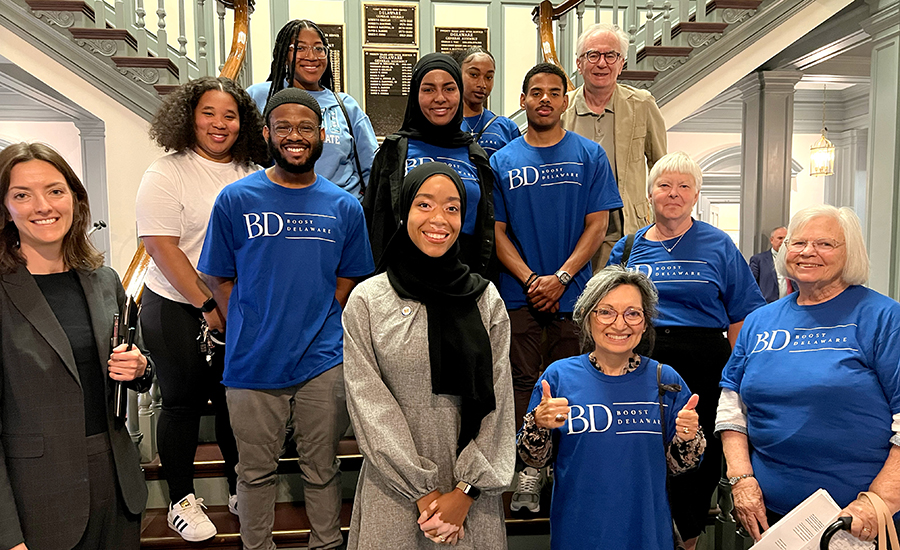DOVER – Legislation that would enshrine residents’ right to a clean and healthy environment in the Delaware Constitution cleared a House committee Wednesday.
Sponsored by Rep. Madinah Wilson-Anton, House Bill 220 recognizes the importance of protecting Delaware’s natural resources and ensuring clean water, air and healthy ecosystems for future generations. Known as the Green Amendment, HB 220 represents the first leg of a constitutional Green Amendment that would add language to the Delaware Constitution to conserve, protect and maintain our state’s natural resources.
“When we talk about the inherent rights that each of us enjoy, we sometimes distill things down to the Declaration of Independence’s ‘life, liberty and the pursuit of happiness.’ Our ability to enjoy life in Delaware in large part is tied to our enjoyment and use of our natural resources, including our state parks, national wildlife refuges, rivers, lakes and streams, and the beaches along the coastline,” said Rep. Wilson-Anton, D-Newark/Bear.
“At the same time, we’re facing a climate crisis that is threatening the very way of life that so many of us enjoy and often take for granted. That’s why we need a Green Amendment in Delaware. We need to enshrine these rights as being vital for our survival. This is literally about the air we breathe and the water we drink. Many of the bills we are considering right now will take direct action, but adding this to the Delaware Constitution will guide current and future generations to continue fighting for our environment.”
HB 220 would add language to the Constitution stating that Delawareans have “an inherent and inalienable right to a clean and healthy environment, including water, air, soil, flora, fauna, ecosystems and climate, and to the preservation of the natural, cultural, scenic and healthful qualities of the environment.”
Released from the House Administration Committee, HB 220 would make clear that all branches, agencies and political subdivisions of the state would serve as trustee of Delaware’s natural resources and be responsible for conserving, protecting, and maintaining them.
Recent studies and reports highlight the importance of taking action to protect the environment, particularly in the lowest-lying state in the continental United States.
According to a 2022 Environmental Integrity Project report, Delaware has the highest percentage of rivers and streams impaired by pollution in the country. US News & World Report ranked Delaware as #45 states in natural environment and #47 in pollution.
A 2021 study from environmental advocacy group Natural Resources Defense Council found that American families spend an average of $2,500 in medical bills each year because of air pollution.
“Our natural environment is not separate and apart from our society,” said Sen. Stephanie Hansen, chair of the Senate Environment & Energy Committee and Senate prime sponsor of HB 220. “Rather, the health, safety and welfare of our society is inextricably linked to the health, safety and welfare of the fragile ecosystems, biodiversity and climate that make up the world around us. You simply cannot have one without the other. The rights of future generations to enjoy Delaware’s natural heritage is already spelled out in the oath of office dictated by our state Constitution. The legislation Rep. Wilson-Anton and I have introduced seeks to make those rights more than words that elected officials recite every couple of years. It will make the right to a clean and healthy environment something we all share as Delawareans.”
The Green Amendment is a continuation of a series of environmental bills introduced last month setting ambitious greenhouse gas emissions reduction targets for the next 25-plus years and also achieving those goals to cut emissions in Delaware. Taken together, the bills would drive the First State toward a more sustainable future by reducing the state’s carbon footprint, offering incentives to residents, and ensuring businesses are prepared to utilize renewable energy.
Last week, the House passed the Delaware Climate Solutions Act (House Bill 99), which would set net emissions reduction targets of 50% from the 2005 baseline by 2030 and a 100% net reduction by 2050.
Constitutional amendments require a 2/3 majority in each chamber and must pass consecutive General Assemblies. If HB 220 passes during the two-year 152nd General Assembly, an identical bill must be introduced and passed during the 153nd General Assembly, which runs from 2025-26.
###


